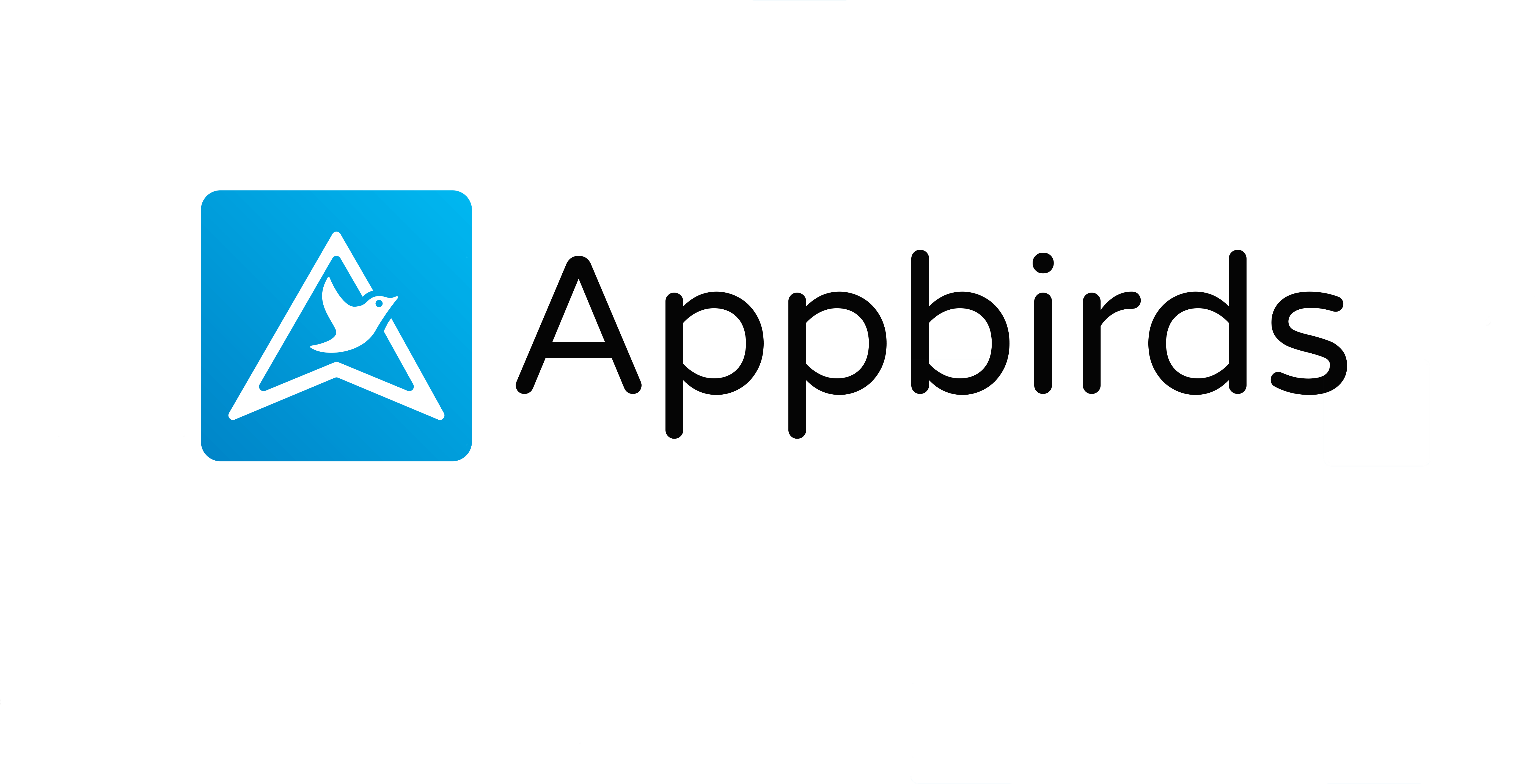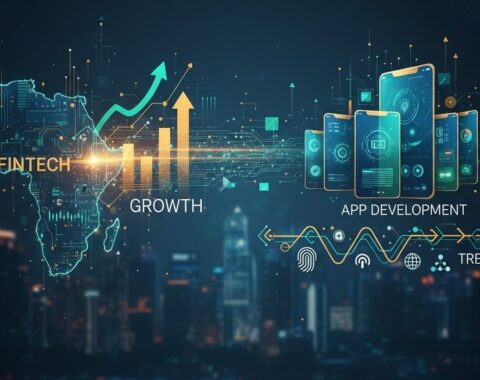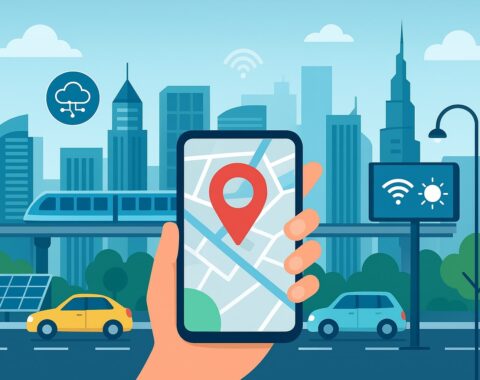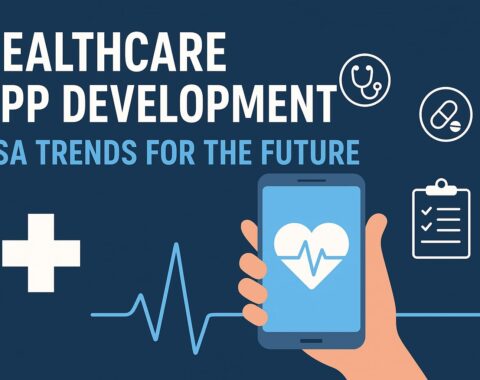In today’s fast-paced digital world, mobile applications have become a crucial asset for businesses. Whether it’s to enhance customer engagement, streamline operations, or boost revenue, having a well-designed mobile app can give your brand a competitive edge. At Appbirds Technologies, we specialize in creating user-centric mobile applications that drive results. In this guide, we’ll walk you through the mobile app development process to help you understand what it takes to build a successful mobile app.
Step 1: Laying the Foundation – Defining Your App Idea and Goals
Every successful mobile app starts with a solid idea and clear goals. It’s essential to ask yourself critical questions such as:
- What problem does my app solve?
- Who is my target audience?
- What key features will differentiate my app from competitors?
Having a well-defined vision sets the foundation for success. Begin by conducting brainstorming sessions with your team, identifying must-have features, and documenting a roadmap for development. Create user personas to understand your ideal customers and their needs. This early clarity will help in designing a solution that addresses real-world problems efficiently.
Step 2: Understanding Market Needs – Conducting Market Research
Market research plays a critical role in ensuring your app’s success. It helps you analyze competitors, identify user expectations, and discover market gaps that your app can fill. Effective market research involves:
- Competitor Analysis: Studying similar apps to understand their strengths and weaknesses.
- User Feedback & Surveys: Conducting surveys and focus groups to gather insights from potential users.
- Industry Trends & Monetization Strategies: Understanding how competitors generate revenue and determining the best business model for your app.
By conducting thorough research, you gain a better understanding of what users expect, allowing you to create an app that provides real value and stands out in the competitive market.
Step 3: Selecting the Right Technology – Choosing the Best Tech Stack
The technology stack you choose will impact your app’s performance, scalability, and development cost. The primary options include:
- Native Development: Uses Swift for iOS and Kotlin for Android, offering the best performance and seamless user experience.
- Cross-Platform Development: Frameworks like Flutter and React Native enable you to develop a single codebase for multiple platforms, reducing costs and development time.
- Progressive Web Apps (PWAs): These offer a cost-effective web-based solution with offline capabilities, ideal for simple applications.
Selecting the right tech stack depends on factors like project complexity, budget, and target audience. Consulting with an experienced development team ensures that your app is built using the most suitable technologies.
Step 4: Designing an Exceptional User Experience – UI/UX Design
A great user interface (UI) and user experience (UX) design can make or break your app’s success. The design phase involves:
- Wireframing & Prototyping: Creating blueprints that map out the app’s structure and functionality.
- Visual Design: Implementing branding elements such as typography, color schemes, and interactive UI components.
- User Testing & Feedback: Conducting usability tests to refine the app’s design before development.
- Responsive Design: Ensuring the app functions seamlessly across different screen sizes and devices.
A visually appealing and intuitive design enhances engagement, encourages retention, and ensures that users have a seamless experience navigating your app.
Step 5: Building the Core – App Development Process
App development consists of two main components:
- Frontend Development: Focuses on the visual elements and interactions users engage with, ensuring a smooth and intuitive experience.
- Backend Development: Manages data storage, authentication, server logic, and API integrations, ensuring that the app functions efficiently.
Key Considerations During Development:
- Agile Development Approach: Implementing agile methodologies enables faster development cycles and iterative improvements.
- API Integrations: Using secure APIs enhances functionality and allows third-party service integrations.
- Performance Optimization: Ensuring the app loads quickly, runs smoothly, and handles high user traffic efficiently.
- Scalability: Designing an architecture that supports future updates and growing user demand.
With the right development approach, your app can be built efficiently while ensuring high performance and scalability.
Step 6: Ensuring Quality – Testing and Quality Assurance (QA)
Thorough testing is crucial to eliminate bugs and deliver a smooth user experience. The QA process includes:
- Functional Testing: Ensuring that all features work as intended.
- Usability Testing: Verifying that the app provides an intuitive and easy-to-use experience.
- Performance Testing: Optimizing the app’s speed, load times, and responsiveness.
- Security Testing: Protecting user data against cyber threats and vulnerabilities.
- Compatibility Testing: Ensuring that the app performs well across various devices and operating systems.
By identifying and fixing potential issues early, you can prevent major problems after launch and enhance user satisfaction.
Step 7: Bringing Your App to the World – Deployment and App Store Submission
After successfully completing all testing phases, the app is ready for deployment. The launch process involves:
- Meeting App Store (iOS) and Google Play Store (Android) compliance guidelines.
- Preparing metadata, including descriptions, keywords, screenshots, and promotional materials.
- Setting up monetization models such as in-app purchases or subscription plans.
- Submitting the app for review and approval by the respective app stores.
App Store Optimization (ASO) Strategies:
To ensure your app reaches a wider audience, optimize your app listing with:
- Relevant Keywords to enhance searchability.
- High-Quality Visuals that attract users.
- Encouraging Positive Reviews to build credibility and increase downloads.
A well-planned launch strategy ensures that your app gains traction from day one.
Step 8: Post-Launch Success – Ongoing Support and Maintenance
App development doesn’t stop after launch. Continuous updates and improvements are essential for long-term success. Key post-launch activities include:
- Bug Fixes: Addressing issues based on user feedback.
- Performance Enhancements: Ensuring optimal speed and stability.
- Feature Upgrades: Introducing new functionalities to keep users engaged.
- Security Updates: Maintaining compliance with evolving security standards.
- User Analytics Monitoring: Tracking user behavior to refine app features and improve user experience.
Providing ongoing support ensures that your app remains relevant and competitive in the long run.
Maximizing Revenue – Choosing the Right Monetization Model
To generate revenue, you need a well-defined monetization strategy. Popular models include:
- Freemium Model: Offering free basic features with premium paid upgrades.
- Subscription Plans: Charging users on a monthly or yearly basis for exclusive content.
- In-App Advertising: Monetizing through third-party ads.
- In-App Purchases: Selling virtual goods, upgrades, or premium content.
- Sponsorships & Partnerships: Collaborating with brands for promotional opportunities.
Selecting the right revenue model depends on your app type, target audience, and business objectives.
Why Choose Appbirds Technologies?
At Appbirds Technologies, we offer comprehensive mobile app development services, ensuring:
- Tailor-Made Solutions customized to your business needs.
- Agile Methodologies for efficient, high-quality development.
- Scalable and Secure Applications designed for future growth.
- Cross-Platform Expertise for maximum reach.
- Post-Launch Support to keep your app optimized and competitive.
Final Thoughts
A successful mobile app requires strategic planning, innovative design, and continuous improvements. By following a structured development process, you can create an app that delivers real value and stands out in the market. Is it time to turn your app idea into reality? Contact Appbirds Technologies today for expert mobile app development services!
Frequently Asked Questions (FAQs)
What is the timeline for mobile app development?
The timeline depends on app complexity, features, and platform. A simple app takes around 3-4 months, while complex apps may take 6-12 months or more. Proper planning, testing, and revisions affect the duration.
Which is better: Native or Cross-Platform app development?
Native development (Swift for iOS, Kotlin for Android) provides the best performance, security, and user experience but requires separate development for each platform. Cross-platform frameworks (Flutter, React Native) allow a single codebase to run on both iOS and Android, reducing costs and time. The choice depends on your app’s complexity, target audience, and budget.
How do I monetize my mobile app?
There are multiple ways to generate revenue from a mobile app, including in-app purchases, advertisements, subscriptions, and sponsorships. The freemium model allows users to download the app for free and unlock premium features with payments. The right monetization strategy depends on the app type, industry, and user behavior.
What are the key factors for a successful mobile app?
A successful mobile app requires in-depth market research, an intuitive UI/UX design, robust development, and a well-defined marketing strategy. User engagement, seamless performance, security, and regular updates also contribute to an app’s long-term success. Additionally, collecting user feedback and making improvements based on it helps maintain app popularity.
What is App Store Optimization (ASO), and what makes it essential?
App Store Optimization (ASO) is the process of improving an app’s visibility in app stores by optimizing keywords, titles, descriptions, screenshots, and reviews. ASO helps in increasing organic downloads and improving search rankings. A well-optimized app has a higher chance of being discovered by potential users, leading to better engagement and revenue.
Do I need post-launch support for my app?
Yes, post-launch support is essential for maintaining app performance, fixing bugs, improving security, and adding new features. Regular updates help keep the app compatible with the latest operating system updates and evolving user needs. Without ongoing support, an app may experience performance issues, security vulnerabilities, and a decline in user engagement.
How do I ensure my app is secure?
Security is a critical aspect of mobile app development, requiring encryption of sensitive data, secure authentication methods, and regular security audits. Using secure APIs, following best coding practices, and implementing two-factor authentication (2FA) can help protect user information. Regular updates and security patches are also necessary to prevent vulnerabilities and cyber threats.
Can I update my app after it’s launched?
Yes, updating an app after launch is crucial for maintaining user engagement and fixing potential issues. Updates can include bug fixes, new features, UI/UX improvements, security enhancements, and compatibility adjustments with new devices and operating systems. Regular updates show users that the app is actively maintained and evolving according to their needs.
Why choose Appbirds Technologies for mobile app development?
At Appbirds Technologies, we provide end-to-end mobile app development services, from ideation and design to development and post-launch support. Our team specializes in creating scalable, high-performance apps with a user-centric approach. We focus on innovation, security, and seamless functionality to ensure your app meets business goals while providing a top-notch user experience.



